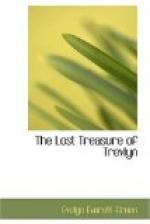“Ruined in estate, too often injured in body, hated, despised, hunted to death like beasts of the earth, what is left for us but some great struggle after our lives and liberties?” concluded the speaker, in his half melancholy, half ardent way. “Verily, when things be so bad that they cannot well be worse, then truly men begin to think that the hour of action is at hand. Be the night never so long, the dawn comes at last. And so will our day dawn for us—though it may dawn in clouds of smoke and vapour, and with a terrible sound of destruction.”
But these last words were hardly heard by Cuthbert, whose attention had been attracted by the regular beat of horse hoofs upon the road behind. Although the track was but a sandy path full of ruts and holes, the sound travelled clearly through the still night air. Whoever these new travellers were, they were coming along at a brisk pace, and Cuthbert drew rein to look behind him.
“There be horsemen coming this way!” he said.
“Ay, verily there be; and moreover I mislike their looks. Honest folks do not gallop over these bad roads in yon headlong fashion. I doubt not they be robbers, eager to overtake and despoil us. We must make shift to press on at the top of our speed. This is an ill place to be overtaken. We have no chance against such numbers. Luckily our steeds are not way worn; they have but jogged comfortably along these many miles. Push your beast to a gallop, my lad; there is no time to lose.”
Cuthbert essayed to do this; but honest old Dobbin had no notion of a pace faster than a leisurely amble. Most of his work had been done in the plough, and he had no liking for the rapid gallop demanded by his rider.
The lad soon saw how it stood with him, and called out to his well-mounted companion not to tarry for him, but to leave him to chance and kind fortune.
“I have so little to lose that they may not think me worth the robbing, belike. But you, sir, must not linger. Your good steed is equal to theirs, I doubt not, and will carry you safe across the heath.”




